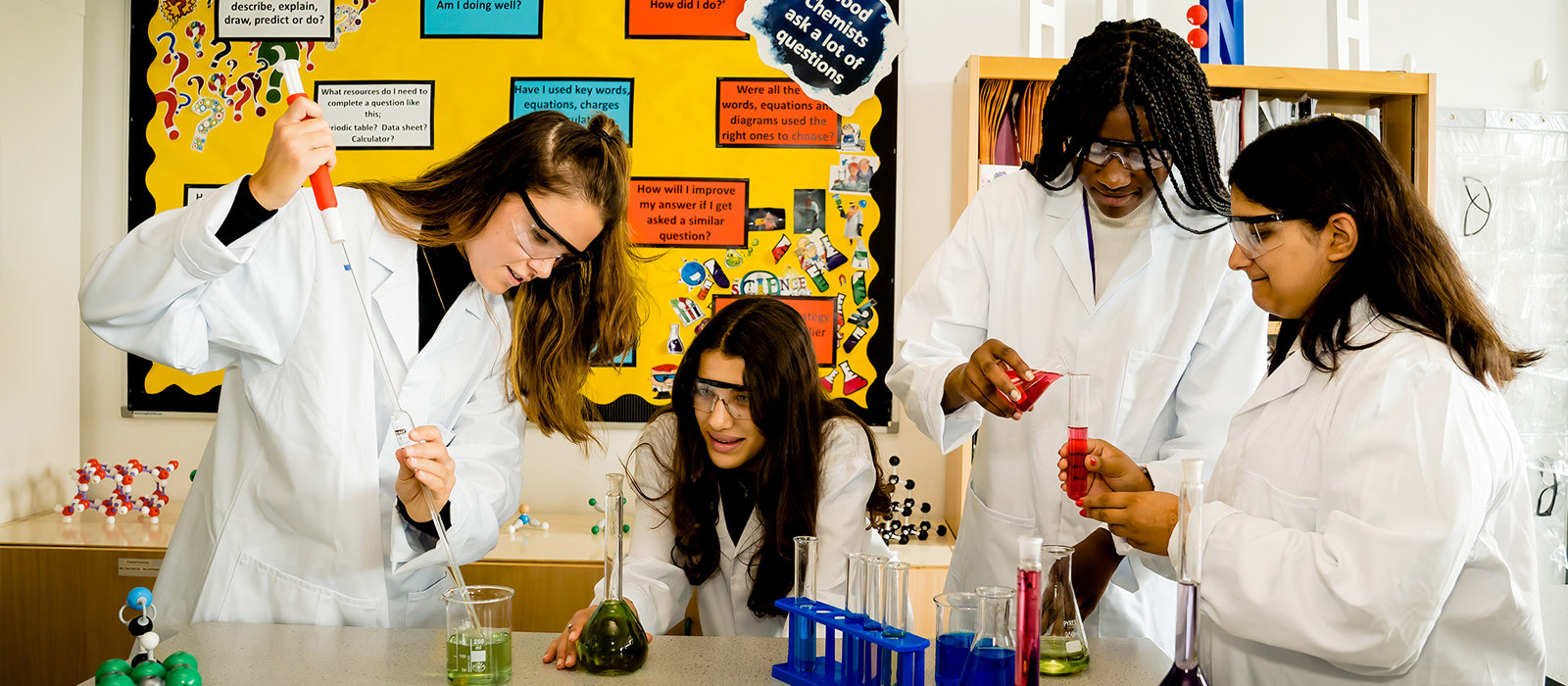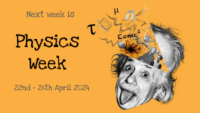Science
Science develops critical thinking skills which enables a deep factual understanding of the universe and nearly everything in it. At BHGS, we will ensure our learner’s develop scientific knowledge and conceptual understanding of the specific disciplines of Biology, Chemistry, Physics and Psychology in order to become self-reliant, self-motivated, life-long learners
Curriculum Intent:
The study of science develops critical thinking skills which enables a deep factual understanding of the universe and nearly everything in it. At BHGS, we will ensure our learner’s develop scientific knowledge and conceptual understanding through the specific disciplines of biology, chemistry, physics and psychology.
The study of biology includes pupils developing an understanding of microbial, plant and animal processes and systems alongside their interactions with each other and their environment. The study of chemistry imparts knowledge and analysis on the foundations of the subject, with emphasis on physical, inorganic and organic chemistry. The study of physics covers the foundations of physics, the universe, mechanics, electricity, waves, fields, particles and nuclear physics. At KS5, the study of psychology includes psychological concepts, theories, research studies, research methods and ethical issues in research.
Learning is carefully sequenced to enable students to build on existing knowledge, deepen their understanding of scientific processes and develop critical evaluation and application skills. Teaching aims to promote enthusiasm for science and to enable pupils to consolidate key knowledge in their long-term memory. All students are enabled to develop and use a range of practical skills. This gives students hands-on experience to test theories, make observations, collect and analyse data and practise using laboratory resources safely. Pupils are also encouraged to enhance and broaden their experience of Science learning at BHGS by participating in Science events outside the classroom so they can think about its application in the wider world and across other subjects.
At all times, science staff intend to – first promote curiosity.
Curriculum
KS3
Students are taught an equal number of topics in Biology, Chemistry and Physics throughout their KS3 Science course. Year 7 have 3 theory lessons and one practical lesson a week, Year 8 have 3 theory lessons a week and Year 9 have 4 theory lessons a week. Year 9 students are introduced to the KS4 curriculum through practical projects which explore the breadth and depth of the OCR Gateway specification. Students are encouraged to think scientifically and a great emphasis is placed on How Science Works and cultivating their practical skills that help develop accuracy and precision. Students learn to correctly display data and formulate conclusions from this data and evaluate theories.
We follow the Dynamic Learning Science specification (https://my.dynamic-learning.co.uk) using the Progress 1 and 2 books to cover the KS3 content. Your child has access to our class text books as well as copies available in the school library. Other resources are available by logging into Google Classroom.
Assessment
- Online quizzes set on personalised Dynamic Learning account
- Tests at the end of a topic.
- Practical assessed tasks.
- An end of year 8 and year 9 examination.
KS4
At KS4 all pupils follow the OCR Gateway Science programme of study. There is choice within the entitlement to study Science, pupils have the opportunity to study Separate Sciences (Triple), or Combined Science depending on their ability. All three courses incorporate aspects of Biology, Chemistry and Physics. They have two 50 minutes lessons of Biology, Chemistry and Physics each week.
Exam Board: OCR Gateway
What will be studied?
The GCSE Science courses Separate and combined, aim to develop knowledge and understanding of Science and how this is related to the everyday phenomena that students have experienced. Students learn to explain these and the observations made during experimental work. A great deal of emphasis is based on thinking and working scientifically and the skills required to do so are developed through opportunities to complete Required Practical activities. Students learn to plan investigative approaches, collect data and analyse this in order to give conclusions. By the end of the course students will also be able to apply scientific knowledge to familiar and unfamiliar situations and interpret and communicate scientific information accurately.
Learning methods:
Students are encouraged to think scientifically and ask questions about their everyday life experiences. They are encouraged to draw conclusions from data and evaluate theories and hypotheses, as well as apply knowledge and understanding to new and unfamiliar situations. A great emphasis has been placed on mathematical skills required in Science and students are taught to apply what they learn in Maths to scientific problems.
The examinations include questions on practical skills and in particular scientific techniques. 16 Required Practical activities have been provided by OCR that are essential and these are carried out and used to develop the skills needed to ensure students will be successful. A great emphasis is placed on ensuring that students learn to become competent scientists and we have an excellent technical team who support teaching and learning in each Science discipline.
How is the course assessed?
There are six units, two in each of Biology, Chemistry and Physics. Each is assessed by a 70 minute examination set and marked by OCR and all papers are equally weighted (16.7% of the grade). In the separate Sciences each examination is 105 Minutes long. In total students take 6 exams at the end of the course in Year 11. A variety of assessment objectives are examined including recall and application of knowledge, as well as analysis and evaluation.
Good literacy and numeracy is very important and exam papers will assess both; approximately 30% of questions in Physics will involve the use of mathematical skills; 20% in Chemistry and 10% in Biology. 16 core practical activities. These are compulsory and questions related to practical skills make up 15% of questions in the examinations.
To ensure good tracking of pupil progress, students are set tests regularly. These made up of past exam questions and outcomes are used to report progress to parents. In Year 10 they take examinations at the end of the summer term.
Year 11 students take mock examinations in December. The outcomes are used to estimate grades that are reported to parents.
KS5
Biology
Exam Board: OCR
Biology has 6 modules:
Modules 1 – 6 and the practical endorsement constitute the full A level.
Module 1 – Development of practical skills.
Module 2 – Foundations in Biology.
Module 3 – Exchange and transport.
Module 4 – Biodiversity, evolution and disease.
Module 5 – Communications, homeostasis and energy.
Module 6 – Genetics, evolution and ecosystems.
Assessment
Formal theory lessons and student-centred activities are used to explore biological topics. Students are required to carry out review and planning tasks between lessons. This involves reading, note-making, researching of topics or answering examination questions. Practical lessons and student presentations develop skills and enhance the learning of syllabus content.
Internal Assessment: Students take regular end of topic tests to assess their knowledge and progress, and to develop exam technique.
External Assessment: A level students will complete three exam papers in the summer of Year 13. Papers 1 and 2 covering topics from a range of modules and paper 3 ‘Unified biology’ covering content from all 6 modules. A level students will also submit a ‘Practical Endorsement’ result following internal.
Chemistry
Exam Board: OCR
Chemistry has 6 modules:
Modules 1 – 6 and the practical endorsement constitute the full A level.
Module 1 – Development of practical skills.
Module 2 – Foundations in Chemistry.
Module 3 – Periodic table and Energy
Module 4 – Core Organic Chemistry
Module 5 – Physical chemistry and transition metals
Module 6 – Organic chemistry analysis
Assessment:
Formal theory lessons and student-centred activities are used to explore Chemistry topics. Students are required to carry out review and planning tasks between lessons. This involves reading, note-making, researching of topics or answering examination questions. Practical lessons and student presentations develop skills and enhance the learning of syllabus content.
Internal Assessment: Students take regular end of topic tests to assess their knowledge and progress, and to develop exam technique.
External Assessment: A level students will complete three exam papers in the summer of Year 13. Papers 1 and 2 covering topics from a range of modules and paper 3 ‘Unified Chemistry’ covering content from all 6 modules. A level students will also submit a ‘Practical Endorsement’ result following internal, teacher assessment of a range of practical tasks completed during lessons.
Physics
Exam Board: OCR
Physics has 6 modules:
Modules 1 – 6 and the practical endorsement constitute the full A level.
Module 1 – Development of practical skills.
Module 2 – Foundations I Physics
Module 3 – Forces and motion
Module 4 – Electrons , Waves and photons
Module 5 – Newtonian world and astrophysics
Module 6 – Particles and medical physics
Assessment:
Formal theory lessons and student-centred activities are used to explore Physics topics. Students are required to carry out review and planning tasks between lessons. This involves reading, note-making, researching of topics or answering examination questions. Practical lessons and student presentations develop skills and enhance the learning of syllabus content.
Internal Assessment: Students take regular end of topic tests to assess their knowledge and progress, and to develop exam technique.
External Assessment: A level students will complete three exam papers in the summer of Year 13. Papers 1 and 2 covering topics from a range of modules and paper 3 ‘Unified Physics’ covering content from all 6 modules. A level students will also submit a ‘Practical Endorsement’ result following internal, teacher assessment of a range of practical tasks completed during lessons.
Visits/Extra Curricular
Students have opportunities to explore Science in Action with participation in Science Fair, The Biology Field Trip, Brain Day, British Science Week and Biology Week.
Annual educational trips include visits to Iceland, Belgium, PGL, The National Space Centre, Sealife Aquarium, GCSE Science Live, The RAF Musuem, The Salter’s Festival of Chemistry, The Science Museum and BayLab.
Further Information
https://my.dynamic-learning.co.uk
Textbooks are provided for all KS4 pupils.







